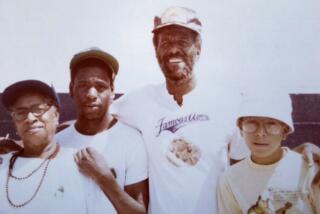Where the Cookie Story--and Other Myths--Crumble
- Share via
A woman and her daughter were lunching at a cafe in a Neiman Marcus when they decided to have chocolate chip cookies for dessert. They didn’t know, as the story goes, that they were about to become Internet superstars.
Their story has been repeated thousands of times via e-mail all over the world during the last few months, and it currently appears on numerous World Wide Web sites. The messages (I’ve gotten it four times in just the last two weeks) always begin: “This is a story forwarded to me about corporate greed. This is true . . . please send this to every single person you know who has an e-mail address. . . .”
To summarize, the woman likes the cookies so much, she asks her waitress if she can have the recipe. Yes, the waitress tells her with a smile, for “only two fifty, it’s a great deal.” The woman says to put it on the lunch tab.
A month later, the lunch bill arrives with a charge of $250 for the recipe, not the $2.50 expected. Neiman’s refuses to back down from the charge and the woman decides to get revenge by putting the recipe out on the Internet. The message indeed ends with the complete recipe.
Except for the part about the Internet, the story sounded familiar. When I was a little boy, my Aunt Anna cut me a piece of delicious, homemade chocolate cake, “just like they serve at the Waldorf in New York.” Anna had never been to the Waldorf, but the recipe had been passed down to her with the explanation that it originally came from a woman who tasted the cake at the hotel and . . . you know the rest.
The cake / cookie story (which was also, at one point, circulating about Mrs. Field’s cookies), is a longtime urban legend--an intriguing story that has no basis in fact, even though people continually pass it on as gospel truth. According to Neiman’s Web site, which has a section devoted to debunking the tale, the store didn’t even serve cookies in its cafes at the time the story first popped up last year.
The Internet has made the distribution of urban myths swifter and more efficient, but it also provides the means to shine a bit of truth on these stories, including this recent gem: An actor playing a Munchkin in “The Wizard of Oz” was so distraught over a love affair that he committed suicide during filming. Proponents of the myth claim he can be seen hanging from a tree in the background during a certain scene.
A study of the scene on video, shot by shot, unearthed no hanging Munchkins.
Other such myths that have found their way to the Net: Slot machines are rusting out because Catholics pour holy water into them, the actress covered in gold paint in “Goldfinger” died from the stunt, and James Dean gave Elvis a Harley that later sold for $2.2 million.
The headquarters for examining urban legends on the Internet is the alt.folklore.urban newsgroup. Several current posts there concern the cookie story, including information on moneymaking scams. It seems at least two people are sending out e-mail claiming that the cookie incident happened to them, and that they are “selling” the Neiman’s recipe to anyone interested for about $6 to pay off their charge card bill.
On the Web, you can access archives on numerous myths at https://www.urbanlegends.com or https://www.snopes.com. But no matter how much debunking is done, some urban legends seem to never completely die.
Neiman’s has taken an “if you can’t beat ‘em, join ‘em” attitude. The store recently announced that it will sell chocolate chip cookies in its cafes, and it published the recipe right on its Web site. It’s substantially different from the one making the e-mail rounds, and it comes free of charge.
I hear, however, that if you read a section of it backward, it contains a message from Satan.
*
Cyburbia’s e-mail address is [email protected].
More to Read
Eat your way across L.A.
Get our weekly Tasting Notes newsletter for reviews, news and more.
You may occasionally receive promotional content from the Los Angeles Times.











